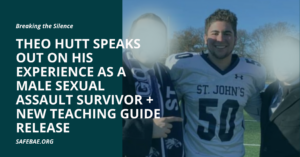Theo Hutt Speaks Out on His Experience as a Male Sexual Assault Survivor + New Teaching Guide Release
Theo Hutt’s story and SafeBAE’s resources shine a light on male sexual assault.
Sexual violence affects people of all genders, yet male survivors of sexual assault often remain silent, hidden behind societal expectations of masculinity. At SafeBAE, we believe it’s time to change that narrative. That’s why we’re releasing a powerful new resource: an exclusive interview with Theo Hutt, a male survivor and advocate, alongside a comprehensive teaching guide. These tools are designed to educate, empower, and support all survivors.
From Survivor to Advocate: Theo Hutt’s Story
Theo Hutt is more than just a SafeBAE board member—he’s a powerful advocate for change, a youth mentor, and a survivor of sexual violence. Currently a junior at Case Western Reserve University, Theo has made a significant impact through his work with SafeBAE, including serving as a youth mentor at the SafeBAE Summer Activist Institute in 2023. His commitment to supporting young people and fostering open conversations about consent is deeply personal, shaped by his own experiences.
n an emotional interview with SafeBAE, Theo shared the story of his own assault—a moment that changed the course of his life and his understanding of vulnerability. Growing up in Topsfield, Massachusetts, and attending an all-boys school, Theo found himself in an environment where hypermasculinity and silence around issues like consent were the norm. But after a traumatic experience at a graduation party, Theo was forced to confront the reality of sexual violence and the stigma that often surrounds male survivors.
As Theo recalled, he was sexually assaulted by a peer while he was intoxicated and unconscious—an experience that left him confused, ashamed, and unsure of where to turn for support. The environment he grew up in hadn’t prepared him for what he went through, and he struggled with feelings of self-blame and isolation. It took time and courage for Theo to open up about what had happened, first confiding in his younger sister before finding his voice as an advocate.
Theo’s story, like those of so many survivors, highlights the need for education, support, and the dismantling of harmful stereotypes about gender and vulnerability. In sharing his experiences through SafeBAE’s platform, he hopes to empower others to speak out, find support, and challenge the misconceptions that prevent male survivors from seeking help. In the next section, we’ll dive deeper into Theo’s reflections on the challenges he faced, the strength he found in speaking out, and how SafeBAE’s new educational guide aims to support survivors like him.
Breaking Down Stereotypes
In his interview with SafeBAE, Theo Hutt tackles one of the most pervasive myths surrounding male survivors of sexual violence: the belief that men always welcome sexual advances. “There’s this idea that men would never say no to sexual advances, that we want sex all the time,” he explains. “But that’s just not true. Sexual assault is a painful, traumatic experience for anyone, regardless of gender. It’s crucial to recognize that being male doesn’t protect someone from being a victim of sexual violence.”
Theo’s words highlight a reality that is often ignored or minimized. While society has made significant strides in supporting female survivors of sexual assault, the narrative around male survivors remains fraught with stigma and disbelief. Many people struggle to understand that men, like women, can be victims of unwanted sexual advances and assault. This misunderstanding often makes it harder for male survivors to come forward, leading to feelings of isolation and shame.
Society’s Perception of Male Sexual Assault
Research indicates that 24.8% of men in the U.S. experience some form of sexual violence in their lifetime, yet they are significantly less likely to report these incidents due to feelings of shame, humiliation, and self-blame. “People assume that because I’m 6’2” and 230 pounds, that nothing like that would ever happen to me because I’d be able to defend myself,” Theo recalls. “And that it just physically could not happen to someone like me.” His experience speaks to a broader societal belief that strength and size can protect men from becoming victims—when in reality, the dynamics of power and vulnerability in assault are far more complex.
The misconception that sexual assault is primarily a crime against women by men further marginalizes male survivors. Although women experience sexual violence at higher rates, about 1 in 33 men have experienced an attempted or completed rape in their lifetime. Additionally, about one in four male victims of completed or attempted rape first experienced it between the ages of 11 and 17, underscoring that sexual violence affects boys and men as well. These statistics make clear the need for a more inclusive understanding of what sexual violence looks like, and the importance of creating spaces where all survivors feel heard and supported.
Creating Safe Spaces Through Education
In conjunction with Theo Hutt’s powerful interview, SafeBAE is launching an educational teaching guide designed to foster a better understanding of male survivors, challenge harmful stereotypes, and provide practical resources for educators and students alike. This teaching guide goes beyond Theo’s story to address the broader misconceptions about male survivors, offering educators tools to build supportive environments where all survivors feel seen and heard.
The teaching guide includes lesson plans and discussion prompts that encourage students to think critically about gender stereotypes and societal expectations around consent and vulnerability. By breaking down the myth that male survivors are less affected or less likely to experience assault, the guide aims to help young people recognize the diverse experiences of survivors. It includes real-world scenarios and activities that allow students to reflect on the impact of peer pressure, toxic masculinity, and societal biases that contribute to the silencing of male survivors.
Fostering Empathy and Understanding
One of the guide’s main goals is to create spaces where male survivors, and all survivors, feel comfortable sharing their experiences. By providing a structured yet flexible framework, the guide enables teachers to facilitate open conversations about consent, respect, and empathy. Students are encouraged to examine how their own perceptions and biases may influence their understanding of sexual violence, helping them develop empathy for others’ experiences.
A Resource for Educators and Advocates
The teaching guide is also a resource for educators seeking to support students who may be struggling to come forward or who feel alone in their experiences. With practical advice on how to handle sensitive conversations and guidance on providing support, it equips teachers to create a classroom culture that values consent, empathy, and safety.
Through Theo’s interview and this teaching guide, SafeBAE hopes to inspire change by challenging stereotypes and equipping young people with the understanding needed to support survivors of all genders. Together, they represent a step toward creating a more inclusive dialogue around sexual violence—one that recognizes the experiences of all survivors and empowers young people to become advocates for safety and respect in their own communities.
A Resource for Educators and Advocates
The teaching guide is also a resource for educators seeking to support students who may be struggling to come forward or who feel alone in their experiences. With practical advice on how to handle sensitive conversations and guidance on providing support, it equips teachers to create a classroom culture that values consent, empathy, and safety.
Through Theo’s interview and this teaching guide, SafeBAE hopes to inspire change by challenging stereotypes and equipping young people with the understanding needed to support survivors of all genders. Together, they represent a step toward creating a more inclusive dialogue around sexual violence—one that recognizes the experiences of all survivors and empowers young people to become advocates for safety and respect in their own communities.
Creating Inclusive Support: Recognizing Male Survivors
Sexual violence against men is a critical issue that demands more awareness and understanding. SafeBAE’s new teaching guide, released alongside Theo Hutt’s powerful interview, is designed to dispel harmful myths, foster inclusivity, and create a supportive environment for all survivors. Through Theo’s story and the teaching guide, SafeBAE aims to encourage meaningful conversations about male sexual assault and provide resources to help educators, parents, and advocates support young men in healing and self-advocacy.
Access the Resources
Both Theo’s interview and the comprehensive teaching guide are available for free on SafeBAE’s website. We encourage educators, parents, and advocates to use these tools to initiate crucial conversations and provide support for male survivors.
- Watch Theo Hutt’s Story: Hear Theo’s experiences and insights firsthand.
- Download the Male Sexual Assault Teaching Guide: Access valuable resources for educating and supporting young people on this important topic.
Join the Conversation
SafeBAE is committed to advocating for all survivors of sexual violence, regardless of gender. We encourage everyone to explore these materials, share them, and become part of a movement that challenges stereotypes and supports survivors.
Support SafeBAE:
- Donate: Your support helps us continue to create and provide free educational resources.
- Get Involved: Discover how you can contribute to our mission and make a difference in your community.
Together, we can break the silence around male sexual assault and ensure that all survivors receive the respect, support, and understanding they deserve.


